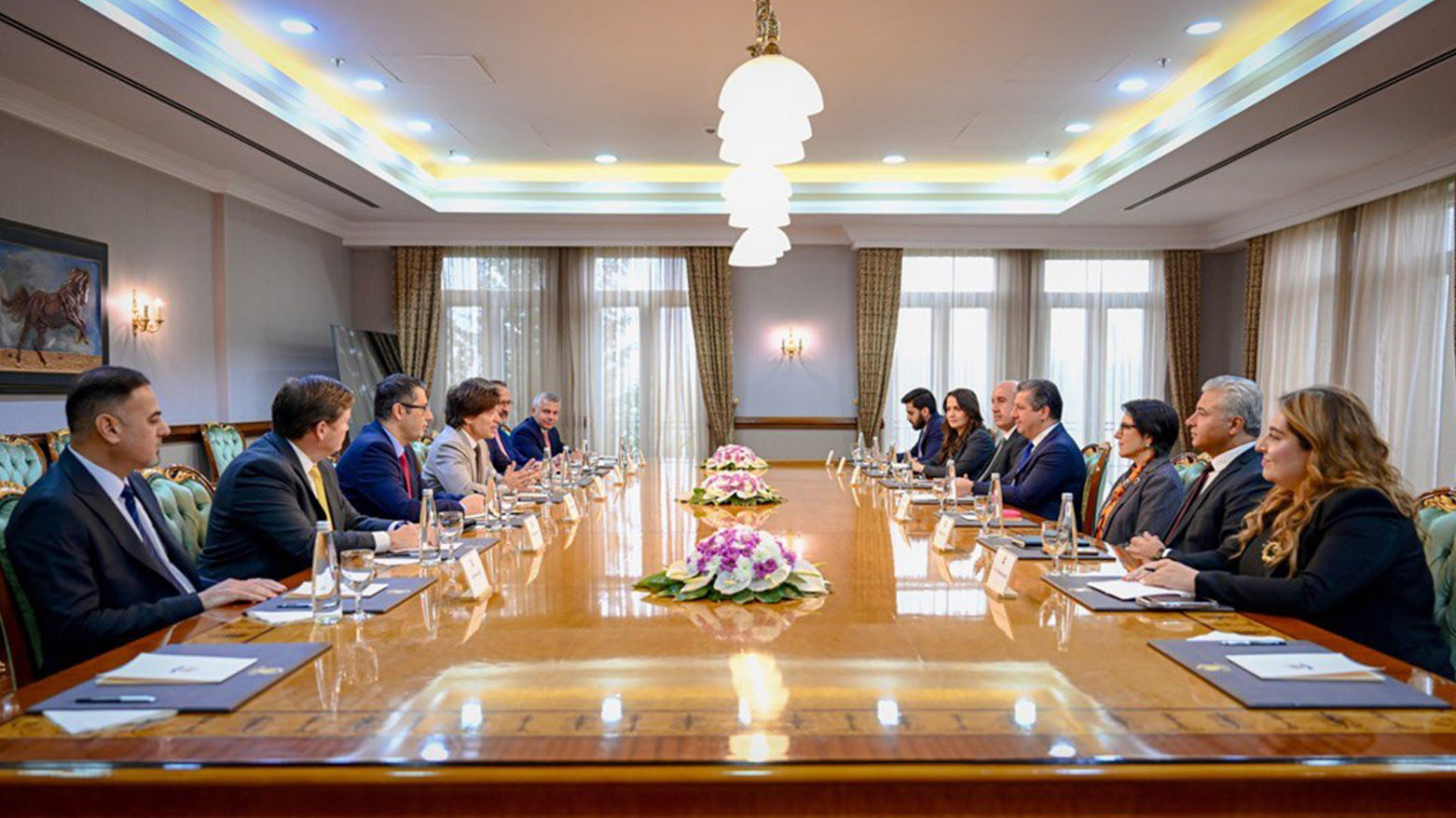KRG Prime Minister Welcomes USKBC Delegation as Kurdistan Deepens Business Ties with American Investors
Meeting highlights investment reforms, sectoral opportunities, and the Kurdistan Region’s expanding role as a secure hub for U.S. capital.

ERBIL (Kurdistan24) — Kurdistan Region Prime Minister Masrour Barzani on Sunday received a delegation from the U.S.-Kurdistan Business Council (USKBC), led by its President David Tafuri, as the autonomous region continues to position itself as one of the Middle East’s most open and secure environments for American and diaspora investment.
The meeting was held as the Kurdistan Region deepens economic engagement with U.S. companies, driven in part by its foreign-investor-friendly legal framework and an expanding strategy to attract diaspora capital—especially from Assyrian, Chaldean, and Syriac communities seeking to rebuild commercial and cultural links with their ancestral homeland.
At the start of the meeting, Tafuri congratulated Prime Minister Barzani on the outcome of Iraq’s recent parliamentary elections and outlined the purpose of the delegation’s visit, stressing the Council’s commitment to expanding American commercial partnerships across the Kurdistan Region.
He also briefed KRG officials on the composition of the visiting delegation, which includes U.S. business leaders, legal experts, and investors exploring opportunities in key economic sectors.
Prime Minister Barzani provided an overview of recent political developments in both the Kurdistan Region and Iraq, underscoring the KRG’s institutional reforms and improved governance under the ninth cabinet.
He highlighted major advancements in the energy sector—particularly natural gas development—as well as ongoing measures to modernize the region’s economic infrastructure and regulatory environment.
Barzani reiterated the government’s strong commitment to enabling and expanding the presence of American companies in the Kurdistan Region.
The visit follows a larger U.S. and Assyrian-American economic outreach effort to the Kurdistan Region, where diaspora entrepreneurs have been examining long-term opportunities supported by Investment Law No. 4 of 2006.
The law allows 100 percent foreign ownership, long-term land use rights, significant tax exemptions, and full repatriation of profits—legal advantages unmatched elsewhere in Iraq, where federal regulations require majority local ownership.
These policies have created renewed momentum for Assyrian diaspora investment, as communities seek sustainable ways to preserve their heritage while fostering economic resilience in historic areas like Ankawa, Alqosh, Amedi, and the broader Nineveh Plains.
During recent meetings with senior KRG officials, including PM Barzani and Board of Investment Chairman Mohammad Shukri, U.S.-based Assyrian investors discussed a range of potential ventures in education, healthcare, agriculture, tourism, and cultural preservation.
On Saturday evening, Board of Investment spokesperson Bargasht Akrayee confirmed that Tafuri’s delegation would meet with top KRG officials, investors, and business leaders across the region to explore joint projects. The USKBC—an influential Washington-based organization—has long played a key role in promoting U.S.-Kurdistan economic ties, frequently organizing visits for American businesses seeking to enter the Kurdish market.
The Kurdistan Region’s comparative stability, legal predictability, and investor-friendly climate have gained growing attention among U.S. business circles. For diaspora groups—particularly Assyrians—the region offers a rare opportunity to build commercial ventures with full ownership, legal protections under international arbitration standards, and a political environment supportive of minority rights.
“This is a historic moment for Assyrians who wish to invest in their homeland,” said Alexander Karana, an American attorney who accompanied the recent delegation, in an analysis published by Global Strat View.
Karana emphasized that the Kurdistan Region’s investment laws allow diaspora communities to participate in economic growth “with dignity, security, and purpose,” reinforcing both cultural identity and long-term communal stability.
As Prime Minister Barzani continues to encourage foreign and diaspora investment, the meeting with the USKBC delegation signals a broader KRG strategy: leveraging international partnerships, nurturing minority-led economic initiatives, and transforming the Kurdistan Region into a regional hub for sustainable, diversified, and globally connected development.